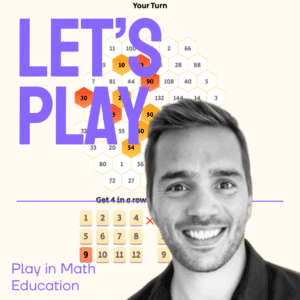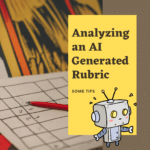Chris Hogbin
We’ve all been there – staring at a page full of numbers, feeling like our brains are about to explode. But what if I told you that there’s a way to learn maths that’s actually fun? A way that involves play in math education and exploration, problem solving and critical thinking, rather than rote memorisation and timed tests.
Play in Math Education
First, let’s talk about why play is so important when it comes to learning maths. As Stuart Brown explains in his book “Play,” play is a crucial component of human development. It’s how we learn about the world around us and develop skills that will be useful later in life. In fact, Brown argues that play is just as important as food, water, and shelter when it comes to our overall well-being.
Now, let’s apply this to maths. Maths is a subject that’s often viewed as dry and uninteresting, but it doesn’t have to be that way. Sunil Singh and Christopher Brownell’s book “Maths Recess” argues that incorporating play into maths education can actually increase student engagement and understanding. When we approach maths with a sense of curiosity and playfulness, we’re more likely to make connections and discover patterns that we might not have seen otherwise.
Overcoming Math Anxiety
In “Mathematical Mindsets”, Jo Boaler argues that anyone can become proficient in maths if they have the right mindset, and that traditional methods of teaching maths can lead to feelings of anxiety and a fixed mindset. It also means students see maths as abstract and rules based. Learning through play helps create a classroom environment that fosters a growth mindset, one where students are encouraged to take risks and explore.
So, how can we incorporate play into maths education? One way is through games. There are countless maths games out there, and some that have fantastic mathematical thinking involved. By playing these games, students can develop their mathematical understanding in a fun and engaging way.
Another way to incorporate play into maths education is through exploration. Rather than simply memorising formulas and procedures, students can be encouraged to explore maths concepts on their own. For example, they might be given a set of blocks and asked to build a structure using geometric principles. Or, they might be asked to solve a real-world problem, such as calculating the volume of a swimming pool. By approaching maths in this way, students are more likely to develop a deep understanding of the subject, rather than simply regurgitating information. It also means they can solve problems rather than just mimicking procedures.
Math is Enjoyable
Of course, there will always be those who argue that play has no place in the classroom, especially when it comes to a subject as “serious” as maths. But I would argue that this attitude is misguided. By incorporating play into maths education, we’re not only making the subject more enjoyable, but we’re also helping students develop important skills such as problem-solving, critical thinking, communication and creativity.
As a teacher or parent you might argue that this is difficult as you need to start with the intended learning goals. The great news is that we can be really intentional in using games that are both extremely engaging and help students build deep understanding of specific mathematical concepts. Here are three examples.
Genius Square – Spatial Reasoning ++
The Genius Square is a highly educational and engaging game that offers numerous benefits for players. It enhances critical thinking, problem-solving, and spatial reasoning skills by challenging players to fit various geometric shapes into a grid. Through strategic planning and logical reasoning, players develop their cognitive abilities and learn to visualize spatial relationships effectively. The game promotes resilience and persistence, as players must persevere through challenging puzzles. Additionally, it fosters social interaction, and collaborative learning, making it a valuable tool for educational settings and family gatherings alike.
Number Hive – Number Operations ++
Number Hive offers exceptional educational value as a math learning app. It helps students build essential skills such as reasoning, critical thinking, and problem-solving through engaging game-based activities. By solving math challenges and puzzles, students develop fluency in number operations, boosting their confidence in numerical calculations. Number Hive transforms math into an enjoyable experience, enhancing student motivation and promoting a positive attitude towards the subject. Its innovative approach cultivates a deeper understanding of mathematics, empowering students to become proficient mathematicians with real-world problem-solving abilities.
Battleships – Coordinate Geometry ++
Battleships is more than just a fun game; it offers significant educational value for students. While playing, students engage in strategic thinking, critical analysis, and problem-solving. They practice spatial awareness, as they must strategically place their ships on the grid and make calculated guesses about the location of their opponent’s ships.
Moreover, Battleships promotes communication and collaboration, especially in the two-player version. Players must effectively communicate their moves and coordinate their strategies, fostering teamwork and social skills.
The game also reinforces math skills, as players use coordinates to identify and target ships. This strengthens their understanding of the Cartesian coordinate system and sharpens their mathematical reasoning abilities.
Incorporating Play Into Maths Education
Wrapping up, incorporating play into maths education can help to create an environment where students feel comfortable to take risks, make mistakes, and explore new concepts in a way that fosters creativity, curiosity, and joy in the learning process. Ultimately, this can lead to deeper understanding and engagement with maths, and a lifelong love of learning.









